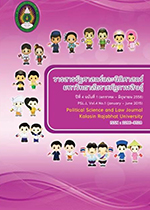The Adaptation Status And the Management Method of the Elder Group Living with the Community : the Case Study of Namon District, Kalasin Province
DOI:
https://doi.org/10.14456/gjl.2015.8Keywords:
ผู้สูงอายุ, การปรับตัว, แนวทางการบริหารจัดการ, elder, adaptation, management methodAbstract
บทความวิจัยนี้ มีวัตถุประสงค์เพื่อศึกษาสภาพการปรับตัวของผู้สูงอายุในดำรงชีวิตอยู่ในชุมชน และแนวทางการบริหารจัดการของหน่วยงานที่เกี่ยวข้องสำหรับให้ผู้สูงอายุสามารถใช้ชีวิตอยู่ในชุมชนได้อย่างสอดคล้องกับสภาพปัจจุบัน ใช้ระเบียบวิธีวิจัยเชิงคุณภาพ ทำการเก็บข้อมูลโดยใช้แบบสัมภาษณ์แบบมีโครงสร้างคำถามแน่นอน กับประชากรผู้ที่มีอายุเกิน 60 ปีขึ้นไปที่อาศัยอยู่ในอำเภอนามน จังหวัดกาฬสินธุ์ แล้วทำการวิเคราะห์ความสอดคล้องระหว่างเนื้อหาเพื่อตอบวัตถุประสงค์ตามที่กำหนดไว้ผลการวิจัยพบว่า กลุ่มผู้สูงอายุในปัจจุบันมีการดำเนินชีวิตที่ขึ้นอยู่กับสภาพทางด้านอาชีพ รายได้ การศึกษา และการเข้าร่วมกิจกรรมอื่นๆ โดยมีการปรับตัวการดำเนินชีวิตในชุมชน ได้แก่ การประกอบอาชีพเกษตร การค้าขาย และรับจ้างทั่วไป มีรายได้ มาจากการอุดหนุนจากรัฐบาล (เบี้ยยังชีพ) ขายผลิตผลทางการเกษตร การเลี้ยงดูของบุตรหลาน การเข้ามีส่วนร่วมกับสังคม เป็นสมาชิกของชมรมต่างๆ เป็นผู้นำในการทำกิจกรรมด้านศาสนา ศิลปวัฒนธรรม ประเพณีท้องถิ่นช่วยดูแลความสะอาดภายในหมู่บ้าน
สำหรับแนวทางในการบริหารจัดการของภาครัฐหรือหน่วยงานที่เกี่ยวข้องในการเข้ามาเป็นผู้ดำเนินการจัดตั้งชมรม สมาคมต่างๆ (ให้เป็นทางการ/ไม่เป็นทางการ) เพื่อให้ความช่วยเหลือสนับสนุนด้านต่างๆ ทั้งนโยบาย การปฏิบัติการพัฒนา ตลอดจนยึดหลักผลประโยชน์ของชุมชนความพอเพียงสามารถดำรงอยู่ได้อย่างยั่งยืน
This article has the objective for studying the adaptation status presently of the elder living in the community and the management method of the agencies relating to the elder living in the community to consistent with the present environment. The qualitative method is utilized by collecting the data with the interview having the certain structural questions for the elder who are more than 60 years old living in the 6 villages of the Namon district, Kalasin province. Then, the data are analyzed the consistency among the contents to answer the defined objectives.
The research results found that the elder live depending on the conditions of occupation, income, education, and other involved activities. The adaptation to live in the community such as agricultural working, trading, general employees, having the income from the government subsidy, selling the agricultural products, feeding their grand children, participating in the society, being the members of various clubs, being the leader of religion, culture, local tradition activities, and taking care of cleaning in the village.
The management methods of the government and other related agencies are to establish the clubs (formal/informal) for helping in the policy, practice, development as well as keeping the benefits of the community to be sustainability
Downloads
Downloads
Published
How to Cite
Issue
Section
License
Copyright (c) 2017 วารสารการบริหารปกครอง (Governance Journal) มหาวิทยาลัยกาฬสินธุ์

This work is licensed under a Creative Commons Attribution-NonCommercial-NoDerivatives 4.0 International License.








